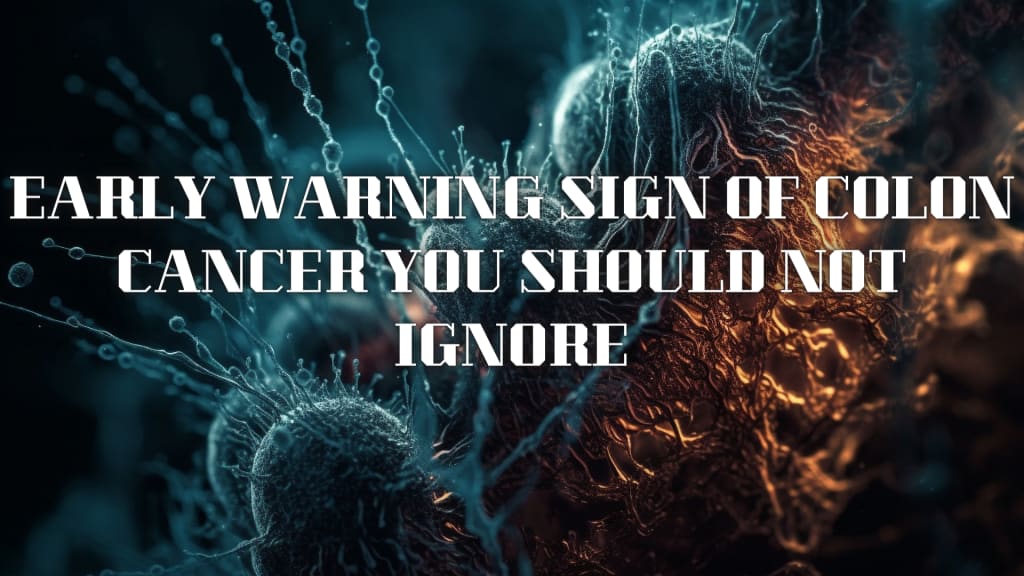EARLY WARNING SIGN OF COLON CANCER YOU SHOULD NOT IGNORE
Colon Cancer

Introduction
Colon cancer, also known as colorectal cancer, is one of the most common types of cancer worldwide. It occurs in the colon or rectum, which are crucial parts of the digestive system. Identifying the early warning signs of colon cancer is vital for timely diagnosis and effective treatment. While the risk of colon cancer increases with age, it can affect individuals of all ages. In this article, we will explore the early warning signs of colon cancer that you should not ignore.
Persistent Changes in Bowel Habits
One of the primary early warning signs of colon cancer is a change in bowel habits. Pay attention if you experience persistent diarrhea, constipation, or alternating bouts of both. Additionally, if you notice your stool becoming narrower than usual, or if you feel the constant urge to have a bowel movement even after doing so, it could be a potential sign of colon cancer.
Blood in the Stool
The presence of blood in the stool, also known as rectal bleeding, is a significant red flag for colon cancer. Blood might appear bright red or dark, and it could be seen in the stool or on the toilet paper after wiping. While not all cases of rectal bleeding indicate colon cancer, it is essential to consult a healthcare professional to determine the cause and rule out serious conditions.
Unexplained Weight Loss
Unexplained weight loss can be a cause for concern, especially if you are not actively trying to lose weight. If you experience a sudden and unintentional weight loss of 10 pounds or more, it is essential to seek medical attention. This symptom could be indicative of various health issues, including colon cancer.
Fatigue and Weakness
Chronic fatigue and weakness can be early signs of colon cancer. When cancerous cells grow in the colon, they can cause blood loss, leading to anemia. Anemia, in turn, can result in fatigue and weakness. If you find yourself constantly tired despite getting enough rest and sleep, it is crucial to get evaluated by a healthcare professional.
Abdominal Pain and Cramps
Abdominal discomfort, pain, or cramps that persist for an extended period should not be ignored. While these symptoms could be caused by various conditions, they might also indicate the presence of colon cancer. If the pain is severe, sudden, or accompanied by other concerning symptoms, seeking immediate medical attention is advised.
Changes in Stool Consistency
Pay attention to any consistent changes in the appearance of your stool. If you notice your stool becoming thin or pencil-like, it could be due to a possible obstruction in the colon caused by cancerous growth. Changes in stool consistency should be discussed with a healthcare professional.
Feeling of Incomplete Emptying
If you frequently experience a sensation of not fully emptying your bowels after a bowel movement, it might be an early warning sign of colon cancer. This feeling could be due to a blockage or tumor growth in the colon.
Family History of Colon Cancer
A family history of colon cancer can increase your risk of developing the disease. If you have close relatives who have had colon cancer or a history of certain hereditary conditions such as Lynch syndrome or familial adenomatous polyposis (FAP), it is crucial to discuss your risk with a healthcare provider and consider appropriate screening measures.
Personal History of Polyps or Inflammatory Bowel Disease (IBD)
Individuals with a personal history of polyps in the colon or inflammatory bowel disease, such as Crohn's disease or ulcerative colitis, have an increased risk of developing colon cancer. Regular screenings and close monitoring are essential for early detection and intervention.
Age and Lifestyle Factors
While colon cancer can affect individuals of all ages, the risk increases significantly after the age of 50. Moreover, lifestyle factors such as a diet high in red and processed meats, low in fiber, sedentary behavior, obesity, smoking, and excessive alcohol consumption can also contribute to an elevated risk of colon cancer.
Conclusion
Being aware of the early warning signs of colon cancer is crucial for early detection and better treatment outcomes. If you experience any persistent or concerning symptoms, it is essential to consult a healthcare professional promptly. Regular screenings, especially for individuals with risk factors, play a significant role in detecting colon cancer in its early stages when it is most treatable. Prioritizing a healthy lifestyle and maintaining regular medical check-ups can also contribute to reducing the risk of colon cancer and promoting overall well-being.
About the Creator
Daniel Adjei
Here, I write about fiction, science and fitness,






Comments
There are no comments for this story
Be the first to respond and start the conversation.